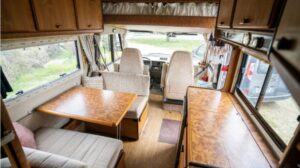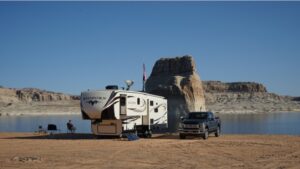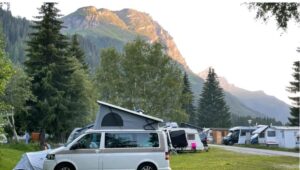You know that feeling when you throw a dart at a map, pack up your life into a tiny, mobile space, and just… go? I do. It’s been 15 years since I traded in my diesel mechanic tools for an RV key, and I haven’t looked back. I’ve been living the full-time RV life, and let me tell you—there’s a lot more to it than just rolling down the highway with the wind in your hair and the sun setting over your shoulder.
Full-time RV living has its moments of pure freedom and excitement, but there’s also a whole lot of technical know-how involved.
As someone who converted my own Class C motorhome into a solar-powered, off-grid oasis, I can assure you: it’s not all sunsets and campfires.
You’ve got to think about your maintenance, your connections, and making sure you’re not stranded on the side of the road with a busted water pump.
That’s why I’m here—to break it all down for you so you can live your best RV life without the stress.
Let’s get into it, shall we?
What Is Full-Time RV Living and Why Is It Gaining Popularity?

You’ve probably heard the buzz—full-time RV living is on the rise. More and more folks are ditching the typical 9-to-5 grind for the freedom of the open road.
Whether you’re in it for the adventure, the freedom to travel, or even the lure of affordable living, full-time RV living offers something unique.
With more people working remotely than ever before, it’s the perfect time to hit the road.
But what does it really mean to live in an RV full-time? For starters, it’s not just about the occasional weekend getaway.
We’re talking about making your RV your primary and only residence. Every day. 24/7. And let me tell you, it’s a lifestyle shift that’s not for the faint of heart.
Here’s the good news: if you’re someone who loves flexibility, minimalism, and the idea of waking up next to a new view every day, full-time RV living could be the best thing you ever do.
But (and this is a big but), it’s not all rainbows. There’s a balance to strike between the freedom of the road and the realities of living small.
Living in an RV Full-Time: What You Need to Know
Living full-time in an RV requires more than just purchasing the vehicle. You’ll need to consider things like where you’ll park your RV, how to maintain it, and how to manage your finances while on the road. Here are some tips for full-time RV living:
Choosing the Right RV
Deciding on the type of RV is the first step. Class A motorhomes offer the most space and luxury, but they come at a higher cost. Class C motorhomes and travel trailers are more affordable and still provide ample living space.
Where to Park
While some people live in their RVs year-round, others choose to park in different places as they travel. RV parks, campgrounds, or private land are the most common options for parking.
Full-Time RV Living for Beginners
For those just starting out, living in an RV full-time can be overwhelming. It’s important to budget for both upfront costs (RV purchase) and ongoing expenses (campsite fees, fuel, maintenance). You’ll also need to plan for a steady internet connection and other work-related tools.
How Does Full-Time RV Living Work? Is It Really for Everyone?
Let’s talk about the nitty-gritty of RV life. Full-time RV living isn’t just about driving from one picturesque campground to the next. There are real challenges you need to be prepared for.
Maintenance—It’s Not Just About The Road Trip

When I first hit the road, I thought I was ready. I had my tools (of course), my systems figured out, and a vague idea of what living in an RV full-time would entail.
The truth? I didn’t know half of what was coming. Sure, your rig may run fine the first few months, but just like any vehicle, RVs need regular maintenance.
From checking your tire pressure to flushing your water system, maintenance is a must. Your RV will go through wear and tear, and that means you’re gonna be hands-on.
If you’re like me and have a background in fixing things, this might sound like a breeze. If not, be prepared to learn.
Internet and Connectivity—The Struggle Is Real

If you’re working remotely, having a reliable internet connection is non-negotiable. Trust me, I’ve camped out in places where cell signals were non-existent, and Wi-Fi was a luxury.
I’ve had to get creative—using mobile hotspots, Wi-Fi boosters, or even satellite internet for those times I needed to do some serious work.
Downsizing—Welcome to Your Tiny Home

Living in an RV full-time means embracing a minimalist lifestyle. You’ll have limited space, which means everything you bring must be necessary, practical, and, ideally, compact.
Downsizing isn’t just about getting rid of excess stuff—it’s about making intentional choices. Do you need the 5 extra jackets? The bulky coffee table? Spoiler alert: You probably don’t.
The key to thriving in such a small space is efficiency—both in your gear and your daily routines. Organize your living space, get creative with storage, and embrace a decluttered life. I promise, it’s liberating.
Full-Time RV Living: What Are the Financial Realities?

Let’s talk about the budget—because full-time RV living isn’t a free ride, even if the road ahead looks tempting.
You’ll need to factor in fuel costs, maintenance, campground fees, and insurance. While some people make it work on a shoestring budget by boondocking or staying at free campsites, there will still be expenses. The key is to plan ahead.
One trick I’ve learned is to focus on the long-term, like investing in RV memberships for discounts at campgrounds or utilizing cheaper boondocking spots.
That said, if you’re living in your RV full-time, the cost can still be comparable to traditional housing—minus the mortgage.
Understanding the Costs of Full-Time RV Living
Full-time RV living can be significantly cheaper than traditional housing, but there are many factors that contribute to the overall cost. Here’s a breakdown of the typical expenses involved in living in an RV full-time.
Initial RV Purchase Cost
The cost of an RV depends on its type and size. Travel trailers typically range from $20,000 to $50,000, while motorhomes can cost anywhere from $50,000 to $600,000+ for luxury models.
Monthly Expenses
Here’s an average cost breakdown for full-time RV living:
-
Insurance: $100–$300/month
-
Fuel: $200–$500/month (depending on travel distance)
-
Campsite Fees: $500–$1,500/month
-
Maintenance: $500–$1,000/year
-
Food & Groceries: $300–$600/month
-
Miscellaneous (entertainment, laundry, etc.): $100–$300/month
Other Costs to Consider
-
Cell phone/Internet plans: $50–$200/month
-
RV storage (if needed): $75–$400/month
-
RV park memberships (e.g., Thousand Trails): $500–$1,000/year
Pros and Cons of Full-Time RV Living
Pros:
-
Flexibility: Move from one location to another and enjoy different environments.
-
Minimalistic lifestyle: Living in an RV encourages decluttering and simplifying your belongings.
-
Adventure: Constantly exploring new places and having new experiences.
Cons:
-
Maintenance: RVs require regular maintenance and repairs, which can be costly.
-
Space: Full-time living in an RV means living in a smaller space, which might be difficult for some.
-
Isolation: Living on the road can feel lonely at times, especially if you’re moving away from loved ones or familiar places.
How Do I Prepare for Full-Time RV Living?

So, you’re ready to go for it, huh? Awesome! But before you get those wheels rolling, let’s go over the preparation steps to ensure you’re set for success.
- Do Your Research: Get to know your RV inside and out. Research models, best RV battery, floor plans, and understand what works best for your lifestyle.
- Budget Wisely: Create a realistic budget for both expected and unexpected costs. Consider fuel, campground fees, and maintenance.
- Downsize: Get rid of anything that doesn’t fit into your RV lifestyle. Be ruthless. (And yes, that includes the things you think you can’t live without.)
- Learn Basic Maintenance: Familiarize yourself with your RV systems. Knowing how to troubleshoot electrical issues or fix a leaky pipe can save you time, money, and headaches.
- Plan for Connectivity: Whether it’s a mobile hotspot, Wi-Fi booster, or satellite, having solid internet is essential.
FAQ: Full-Time RV Living
Why is living in an RV illegal?
Living in an RV full-time can be illegal in certain areas due to local zoning laws or restrictions. Some cities or towns may have ordinances that prevent long-term RV parking or full-time living.
How to live in an RV full-time?
Living full-time in an RV requires a reliable RV, a place to park, and a solid budget for expenses like insurance, fuel, and campsite fees. It’s also essential to plan for maintenance and storage needs.
How much does it cost to live in an RV?
Living in an RV full-time can cost anywhere from $2,000 to $4,000 per month, depending on the type of RV, travel distance, and living arrangements.
Can you live in a camper year-round?
Yes, living in a camper year-round is possible with the right setup. Ensure that your RV is well-insulated and has a reliable heating system for colder months.
Final Scoop Before You Jump In
Look, full-time RV living isn’t for everyone—but if you’re someone who craves adventure, a minimalist lifestyle, and the chance to explore the world at your own pace, it can be a dream come true. Just be prepared to roll with the punches, stay flexible, and keep your rig in top shape.
And hey, if things go wrong (spoiler alert: they will), don’t sweat it. If it’s broke, you can fix it—and I’ll show you how. Safe travels, my fellow RVers!

